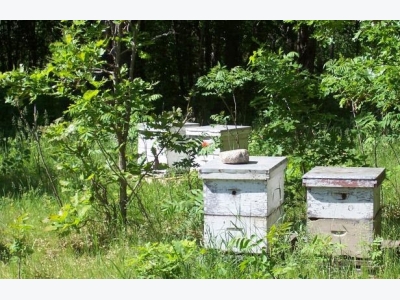Best practices being developed for organic beekeeping industry

Overarching goals of project are to generate evidence-based knowledge for best management practices that will improve colony health in a sustainable, organic beekeeping system.
A nearly $1 million grant from the U.S. Department of Agriculture will support Pennsylvania State University researchers in determining best management practices for organic beekeeping by comparing organic and chemical-free to conventional management systems. The funding comes from the Organic Agriculture Research & Extension Initiative of the U.S. Department of Agriculture's National Institute of Food & Agriculture.
Led by project director Margarita López-Uribe, assistant professor of entomology in Penn State's College of Agricultural Sciences, the research team will conduct a stakeholder-driven, integrated systems-based project to rigorously test the effect of organic, chemical-free and conventional honeybee management practices on honeybee health. To this end, they will quantify colony performance, immune competence and parasite and pathogen levels.
The overarching goals of the three-year project are to generate evidence-based knowledge for best management practices that will improve colony health in a sustainable, organic beekeeping system and to increase economic returns of beekeepers. The researchers hope results from this study will help improve organic agriculture while creating a profitable economic opportunity for beekeepers and organic growers.
The beekeeping industry is challenged in meeting the demands for crop pollination and honey production as the number of colonies continues to dwindle. A recent nationwide survey revealed that even with intensive disease treatment, beekeepers are averaging losses of almost 38% annually. Bees are essential not only for honey production but for pollinating crops that account for approximately a third of the food people consume. This includes a large variety of vegetables, fruits, nuts and animal feed crops.
In this study, "Working toward Best Management Practices for Organic Beekeeping: A Side-by-Side Comparison of Management Systems," scientists will build upon existing research derived from smaller-scale projects. The goal is to address the critical need for an improved management system to better control parasitic mite pressure.
"Varroa mites, which weaken bees' immune systems and transmit viral diseases, are one of the biggest challenges faced by beekeepers," López-Uribe said. "Some of the chemicals beekeepers use to treat for mites also can compromise honeybee health. Our hope is to develop recommendations for mite management that could completely change for the better beekeeping in the U.S."
Project co-director Brenna Traver, assistant professor of biology at Penn State Schuylkill, added, "Comparison of the different management systems on a large-scale level have not been done before. This is a very exciting project where we are taking a different approach into looking at how to alleviate colony losses."
Previous work has shown that current management practices are no longer sufficient, noted project co-director Robyn Underwood, research associate in López-Uribe's lab. "Varroa mites are getting more and more difficult to manage," she said. "Anecdotal evidence of beekeeping success using a chemical-free system leads us to question whether there is an unconventional approach that will lead to significant improvements in honeybee health."
Additional objectives of the study include quantifying pesticide residues in beeswax from colonies in the three management systems, developing a cost/benefit economic assessment of these systems and establishing a long-term extension program to assist stakeholders with incorporating alternative beekeeping management systems.
The researchers will collaborate with the Pennsylvania State Beekeepers Assn. and the Rodale Institute to develop and implement extension programming. The extension plan includes an array of educational activities, including an annual field day, annual workshops and online presentations.
Related news
 Gene may aid high-yield, high-protein soybeans
Gene may aid high-yield, high-protein soybeans Leftovers can be valuable, like when soybean seed is crushed and the oil is extracted, what’s left is soybean meal, a source of high-quality protein.
 Startup fights food waste with travel companions for fruits and veggies
Startup fights food waste with travel companions for fruits and veggies This is the latest in a regular series exploring early-stage technologies and scientific developments that could play a role in corporate solutions to climate
 Dipstick technology could revolutionize disease diagnosis
Dipstick technology could revolutionize disease diagnosis Dipstick can purify DNA and RNA from plant, animal and microbe samples in under 30 seconds. Dipstick technology could revolutionize disease diagnosis